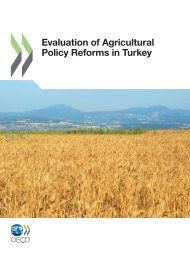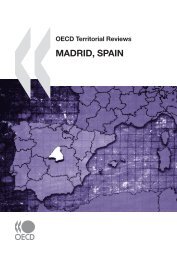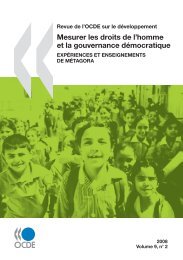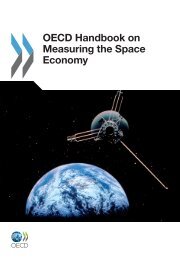Evaluating Country Programmes - OECD Online Bookshop
Evaluating Country Programmes - OECD Online Bookshop
Evaluating Country Programmes - OECD Online Bookshop
Create successful ePaper yourself
Turn your PDF publications into a flip-book with our unique Google optimized e-Paper software.
<strong>OECD</strong> 1999<br />
<strong>Country</strong> Assistance Evaluation in the Multilateral Development Banks<br />
referred to in an increasing number of strategy documents. However, gender gaps<br />
still need to be more rigorously analysed in both strategies and evaluations in<br />
terms of their measurement, patterns, causes, implications and needed actions.<br />
Efforts need to be made to identify countries and regions with disproportionately<br />
large gaps and where efforts have been successful or unsuccessful to reduce them.<br />
<strong>Country</strong> strategies need to reflect these efforts and evaluations need to identify<br />
practices and lessons.<br />
The World Bank’s recent Yemen CAR addressed the gender gap issue. It found<br />
that the Bank’s impact had been modest and recommended that priority should be<br />
placed on female literacy, improving the health and nutritional status of women and<br />
improving women’s access to financial services. The Mozambique CAR found that<br />
attention to gender issues was sporadic due to a lack of an explicit gender strategy.<br />
Institutions need to identify countries and regions with disproportionately large gender gaps<br />
and reflect efforts to reduce the gap in country strategies. Evaluations should focus on country experience<br />
in this area.<br />
Governance<br />
Governance issues are not extensively covered in country strategies; they are<br />
often delicate and usually addressed in countries emerging from upheaval and<br />
requiring reconstruction assistance. In World Bank strategies where governance has<br />
been addressed, coverage has been uneven, often focusing on diagnosis rather<br />
than corrective action or Bank support. Future CAS efforts will focus on addressing<br />
economic aspects of corruption including diagnosis and analysis, causes, impact<br />
and potential Bank activity. The appropriate mix of approaches will depend heavily<br />
on country circumstances.<br />
Coverage of governance issues in CAEs has been light. Reference was made in<br />
the Sri Lanka CAN of the Bank’s assistance not being sufficiently supportive of ethnic<br />
harmony. The Albania CAR provided some discussion of the need for improving<br />
governance and quality of public administration of state institutions in light of<br />
developments in the country.<br />
Institutions need to identify governance and civil society issues when preparing strategies and<br />
appropriate action to address these concerns. Evaluations can focus on the situation in the country<br />
and relate if and how Bank instruments have addressed it.<br />
Environment<br />
Coverage of environmental issues in country strategies varies widely. In some of<br />
the World Bank CASs, the environment is covered extensively in various sectors and<br />
in others there is little more than a mention of a national environmental action plan.<br />
161

















![CQE=U]^\]Z: KAZAKHSTAN - OECD Online Bookshop](https://img.yumpu.com/3915768/1/190x253/cqeuz-kazakhstan-oecd-online-bookshop.jpg?quality=85)